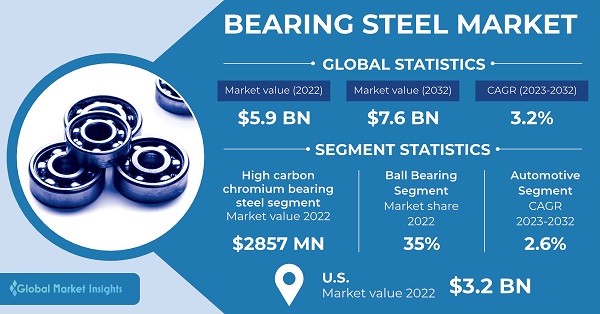Home > Chemicals & Materials > Advanced Materials > Bearing Steel Market
Bearing Steel Market Size
- Report ID: GMI6169
- Published Date: Jul 2023
- Report Format: PDF
Bearing Steel Market Size
Bearing Steel Market size was valued at around USD 5.9 Billion in 2022 and is anticipated to grow at a CAGR of over 3.2% between 2023 and 2032. The industrialization and expansion of the global manufacturing sector are driving the bearing steel demand.
Machinery & equipment manufacturers need bearings for various applications to ensure smooth operations of the automotive, aerospace, industrial machinery, and renewable energy sectors. The automotive industry extensively uses bearings in engines, transmissions, wheels, and other moving parts, thereby augmenting product demand. Thus, the growing automotive production and sales will directly impact the bearing steel demand, thereby accelerating market expansion over the forecast period.
| Report Attribute | Details |
|---|---|
| Base Year: | 2022 |
| Bearing Steel Market Size in 2022: | USD 5.9 billion |
| Forecast Period: | 2023 to 2032 |
| Forecast Period 2023 to 2032 CAGR: | 3.2% |
| 2032 Value Projection: | USD 7.6 Billion |
| Historical Data for: | 2018 to 2022 |
| No. of Pages: | 170 |
| Tables, Charts & Figures: | 203 |
| Segments covered: | Product Type, Application, End Use, and Region |
| Growth Drivers: |
|
| Pitfalls & Challenges: |
|
The automotive industry is a major customer of bearings, using them in engines, transmissions, wheels, and other moving parts. The increasing automotive production and sales will considerably affect the bearing steel demand during the study period.
The fluctuating prices of raw materials utilized in producing bearing steel, such as iron ore and alloys including chromium, molybdenum & vanadium, can considerably influence the total production costs. Bearing steel manufacturers face challenges in maintaining stable product pricing and profitability owing to rapidly increasing prices and disrupted raw material supply. The bearing steel market is thriving with various global market players. This competition puts stress on pricing, product differentiation, and market share. Companies need to focus on innovations, optimize manufacturing processes, and distinguish their products to stay competitive in the market. The bearing steel industry is susceptible to the presence of counterfeit & substandard products, which can lead to safety concerns, premature failures, and damage to machinery or equipment. Manufacturers need to enforce rigorous quality control measures, set up resilient supply chains, and educate customers to mitigate the risks related with these substandard alternatives. These factors may limit product adoption, further restraining market growth.

